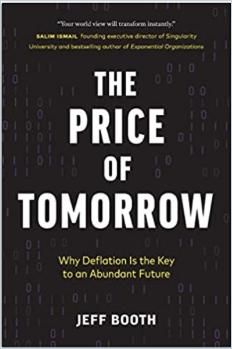Entrepreneur Jeff Booth offers an overview of impending societal and economic changes.

Technology Disrupts
Selected by Goldman Sachs as one of its 100 most intriguing entrepreneurs, Jeff Booth is the co-founder of BuildDirect. His experience grappling with the dynamics of online platforms and artificial intelligence leads him to believe that technology will fundamentally overturn long-held economic precepts. Prices will fall and jobs will disappear, he writes in this sometimes-contrarian take on the future economy, but those changes will bring cheaper living and greater abundance. Economists may quibble with some of his arguments, but Booth clearly depicts developments that are only now beginning to emerge.
Salim Ismail, the founding executive director of Singularity University and best-selling author of Exponential Organizations, said, “As someone who understands the exponential rate that technology is advancing, Jeff Booth has a unique ability to connect the dots to something bigger…Few books offer a more succinct, provocative and enlightening view of the world as it is today, and what it could be tomorrow.” Founder of the Creative Destruction Lab Ajay Agrawal noted that, “in a sweeping analysis that draws upon economics, science, innovation, politics, psychology, sociology and business, Jeff offers an intriguing thesis predicated on the deflationary impact of technological advances, coupled with increasingly easy credit.”
The Old Pattern
Booth begins by stating that societies derive their economic prescriptions from the concept of scarce resources. They assume, Booth maintains, that ever-widening consumer demand creates new jobs and that scarcity produces an inflationary environment.
Technology is deflationary. That is not conjecture. It is the nature of technology. And because technology underpins more and more of the world around us, it means that we are entering into an age of deflation unlike any the world has ever seen. (Jeff Booth)
But, the author insists, technology disrupts these dynamics. He suggests that many goods and services will become less scarce or even free, and that technology will replace jobs faster than new ones can arise. Competition for well-paying jobs, Booth fears, will drive conflict and discord.
Value
In the old economy, Booth says, the control of distribution centers for finished goods – such as chain stores, newspapers, TV networks and other large companies with branch outlets – brought monopoly power. But internet technology, he points out, changed assets from physical units to information bytes. These advancements, according to the author, destroy jobs faster than an economy can create new sectors of consumer demand to replace them. Capitalism’s relentless drive for efficiency constitutes creative destruction.
Booth asserts that technology, by revolutionizing different sectors, will bring deflationary conditions. Work, he repeatedly avows, will disappear, as goods and services become cheaper; computers, he reminds readers, do not need wages.
These things are true: 1) error correction is at the heart of all of our ‘intelligence’; 2) information is growing at an exponential pace; 3) knowledge is being transferred to computers that can gain knowledge and correct errors faster than human brains can; and 4) every one of our jobs is a function of our intelligence.(Jeff Booth)
Booth regards network effects as the underlying dynamic of platform dominance: When a business becomes the most popular in its field, each additional user makes the service more valuable and essential to all other users. Platform companies, Booth predicts, will amass monopoly power and continue to grow.
Solar Power
Technology also disrupts the energy economy, Booth points out; solar power can overtake fossil fuels and threaten industry jobs and infrastructure. Solar energy exemplifies creative destruction, Booth realizes, because more households could disconnect from energy company grids and become self-sufficient producers, thus threatening the economic foundation of the current system. Booth offers this as a metaphor for how increasingly cheaper, more independent technologies may free consumers from long-standing commercial monoliths.
Not Sustainable
Booth tells how the US government deals with the deflationary impact of technology by stimulating the economy through increased borrowing. When the deflationary pressures of technology finally win out, Booth asserts, these borrowings will become unmanageable. The only worthwhile debt, he underscores, improves future productive capacity and thus pays for itself.
Unavoidable
Booth’s fundamental position is that new technology and its obliteration of jobs is unavoidable.
Put the lagging GDP growth with illusionary asset price inflation, plus an impossible-to-maintain rise of debt, against a backdrop of technology growing at an exponential rate, and the phase transition starts to come into focus. (Jeff Booth)
He recognizes that there will be less work but that goods will be cheaper, raising living standards.
Economic Futurism
Booth is not a political writer; he chooses neither side of the current spectrum and regards politics as largely irrelevant, compared to the juggernaut of economic changes arriving in the near future. While his work is both prescriptive and descriptive, Booth delves more deeply into explaining myriad market and economic dynamics than in making absolutely clear what governments and societies should do about them. Booth does recommend changes in long-entrenched policies and is adamant about the need for those changes. But he at time reverts to the entrepreneur’s demand for instantly upending paradigms without honoring how slowly government moves or detailing how that upending might proceed.
That very attitude makes this a compelling, prescient read of great value for investors, policy makers, students and entrepreneurs. Booth carefully illuminates the nexus of technology and policy, and few others books explore that intersection with his rigor and concern.
Readers who engage with Booth’s concepts can enhance their understanding of contemporary economics by also reading Kate Raworth’s Doughnut Economics or Capital in the Twenty-First Century by Thomas Piketty.





